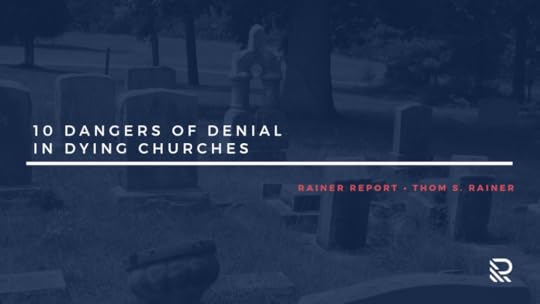Thom S. Rainer's Blog, page 129
March 1, 2019
Five Highly Effective Ways to Enhance Corporate Prayer in Your Church – Rainer on Leadership #515

Podcast Episode #515
SUBSCRIBE:
iTunes • RSS • Stitcher • TuneIn Radio • Google Play • iHeart Radio • Spotify
Corporate prayer is instrumental in shaping the DNA of a church. A praying church is often one who realizes that they are fully dependent on God’s power. Today, we discuss five ways you can increase the power and frequency of prayer in your church.
Some highlights from today’s episode include:
Responsive readings and corporate guided prayer have declined in popularity in worship services. Maybe we contemplate bring them back.
“Publicly declaring the excellencies of Christ and the greatness of God—what pastor wouldn’t want that in their church?”
God is in the business of answering prayers.
An effective prayer ministry follows up with requests.
The five ways we discuss are:
Incorporate intercessory worship prayer warriors.
Make options clear in the worship services.
Have two minutes of praise for answered prayers.
Pray over prayer walkers
Show prayer responses from an intercessory prayer site.
Resources mentioned in today’s podcast
The Prayer Engine
Pro-Nounce Video Services
Pray and Go
Rainer on Leadership is a member of the LifeWay Leadership Podcast Network
Episode Sponsors
 The ministry landscape is changing, and the need for biblical training is more necessary than ever. It’s time to get your Master of Divinity degree. The M.Div —Midwestern Seminary’s flagship degree program — is the primary track for ministry preparation. At just 81 hours, the Midwestern M.Div offers a complete foundation for full-time ministry leaders, offering everything you need, and nothing you don’t. Join other students in vibrant Kansas City as you train in a unique collaborative environment focused on the local church or study online in your current ministry context. Midwestern Seminary is developing a discipleship culture devoted to the local church and committed to God’s unchanging Word. Why not start your training today?
The ministry landscape is changing, and the need for biblical training is more necessary than ever. It’s time to get your Master of Divinity degree. The M.Div —Midwestern Seminary’s flagship degree program — is the primary track for ministry preparation. At just 81 hours, the Midwestern M.Div offers a complete foundation for full-time ministry leaders, offering everything you need, and nothing you don’t. Join other students in vibrant Kansas City as you train in a unique collaborative environment focused on the local church or study online in your current ministry context. Midwestern Seminary is developing a discipleship culture devoted to the local church and committed to God’s unchanging Word. Why not start your training today?
Find out more at mbts.edu/mdiv.
 Vanderbloemen Search Group is the premier pastor search firm dedicated to helping churches and ministries build great teams. They’ve helped thousands of churches just like yours find their church staff and are uniquely geared to help you discern who God is calling to lead your church.
Vanderbloemen Search Group is the premier pastor search firm dedicated to helping churches and ministries build great teams. They’ve helped thousands of churches just like yours find their church staff and are uniquely geared to help you discern who God is calling to lead your church.
For more information, visit WeStaffTheChurch.com.
Feedback
If you have a question you would like answered on the show, fill out the form on the podcast page here at ThomRainer.com. If we use your question, you’ll receive a free copy of Becoming a Welcoming Church.
February 28, 2019
Seven Reasons Why Church Revitalization Is an Honorable Calling – Revitalize & Replant #082

SUBSCRIBE TODAY:
iTunes • RSS • Stitcher • TuneIn Radio • Google Play • Spotify
Being called to pastor a church in need of revitalization or replanting is an honorable calling. Today, we explain why.
This Week’s Question:
FROM KYLE — In Episode #061, you mentioned that revitalization is a noble calling. I thought it was a great point. Can you expound on the reasons for that in a future episode?
Episode Highlights:
“I don’t believe God would be calling so many people to revitalization if He wasn’t about to do something incredible.”
“Dying churches are not something to run away from, but something to run to.”
“10% of our churches will close in the next five years if they don’t change something.”
Pastoring a dying church will have its costs, but seeing God move and turn it around will be the greatest reward imaginable.
The seven reasons we cover are:
Because Christ loves His churches
Because Christ loves the communities in which these churches are located
Because no church address is an accident
Because revitalization is desperately needed
Because God’s resources are at risk
Because it is self-sacrificial
Because it demonstrates the power of the Gospel
Resources mentioned in this episode include:
ChurchAnswers.com
ChurchReplanters.com
Replanter Assessment
Find more resources at the Revitalize & Replant page at ThomRainer.com

Revitalize & Replant is sponsored by the North American Mission Board and ChurchReplanters.com. More than 10% of churches in North America are at risk of closing and the North American Mission Board is committed to reversing this trend by decreasing the death rate of existing churches while simultaneously increasing the birth rate of new churches. To learn more about what it means to become a replanting pastor or to explore resources for replanting and revitalization in your own church, visit ChurchReplanters.com.
Submit Your Question:
Do you have a question about church revitalization or replanting for us to use on the podcast? Visit the podcast page to submit your question. If we use it on the show, you’ll get a copy of Autopsy of a Deceased Church and Reclaiming Glory.
February 27, 2019
Six Reasons Relaunching Is More Difficult Than Revitalizing or Replanting

Relaunching. Revitalizing. Replanting.
So many “re” prefixes. It gets confusing.
Let’s review our definitions. Revitalizing means an existing congregation experiences health and turnaround. Replanting typically means another church acquires a declining or dying church and starts it anew. Relaunching could be considered a hybrid approach. A declining or dying church re-starts itself. There is usually a name change, but there is not an acquisition by another church.
Of the three, relaunching is both the rarest and most difficult. Let’s look at six reasons this challenge has many obstacles.
Relaunching can be perceived to be a magic bullet. The congregation sometimes think they can slap a new name on the sign, have a grand re-opening, and watch growth take place.
Relaunching does not always address the issues and people that are barriers to church health. Church health is a DNA issue. Without changes in the essential hearts and attitudes of the people, healthy change will not take place.
Relaunching can divide a church. This divide can occur along many fault lines, especially worship styles and name changes.
Relaunching will struggle if expectations and sacrifices are not explicit and clear. Otherwise, members will have varying expectations about the changes and results of a new launch. Clarity and transparency are essential.
Relaunching is often a compromise. It’s the “in-between” decision between revitalization and replan There is not a total commitment to the process.
Relaunching is often decided without really knowing the change readiness of the church. This factor is essential. It will be a focus of future emphases here and at Church Answers.
You may conclude I am not a proponent of relaunching. It might surprise you that I actually see it as an incredible option for dying and declining churches. But it is an option that requires open eyes, willing hearts, and sacrificial actions.
You will hear more about these issues later. For now, let me hear from you.
February 26, 2019
Six Issues Regarding Mega Vacancies in Megachurches – Rainer on Leadership #514

Podcast Episode #514
SUBSCRIBE:
iTunes • RSS • Stitcher • TuneIn Radio • Google Play • iHeart Radio • Spotify
More people often means more problems. And that is the case with megachurches when it comes to finding pastors. Today we discuss some of the reasons for this struggle.
Some highlights from today’s episode include:
Many people have negative stereotypes of megachurches, and many are simply unfair and wrong.
The concept of ladder climbing and quickly bouncing from church to church is foreign to many Millennial pastors.
Many churches overbuilt their worship space in the past and are now remodeling that to create larger foyers and more intimate worship gatherings.
When pastor search committees try to find pastors the way they always have done so, they will struggle with the process because churches and pastors have changed in the past 20-30 years.
The six reasons megachurches are struggling to find pastors are:
These churches have similar profiles of the type of pastor they want.
The number of Millennials who are in vocational ministry and meet the profile is small.
Fewer Millennials are excited about leading a megachurch.
Millennials are concerned about the large worship centers many megachurches have.
Many search committees (or their equivalent) try to look for a pastor in the old traditional path.
Many megachurches did not have a succession plan.
Resources mentioned in today’s podcast
Church Answers
Next: Pastoral Succession That Works
Rainer on Leadership is a member of the LifeWay Leadership Podcast Network
Episode Sponsors
 Vanderbloemen Search Group is the premier pastor search firm dedicated to helping churches and ministries build great teams. They’ve helped thousands of churches just like yours find their church staff and are uniquely geared to help you discern who God is calling to lead your church.
Vanderbloemen Search Group is the premier pastor search firm dedicated to helping churches and ministries build great teams. They’ve helped thousands of churches just like yours find their church staff and are uniquely geared to help you discern who God is calling to lead your church.
For more information, visit WeStaffTheChurch.com.
 Today’s episode is sponsored by Midwestern Baptist Theological Seminary. Be sure to check out Midwestern’s Doctorate of Ministry Degree. The D.Min. is an advanced degree preparing students for leadership in local churches and denominational service. It is also fully attainable in hybrid format which means you don’t have to move to pursue the degree.
Today’s episode is sponsored by Midwestern Baptist Theological Seminary. Be sure to check out Midwestern’s Doctorate of Ministry Degree. The D.Min. is an advanced degree preparing students for leadership in local churches and denominational service. It is also fully attainable in hybrid format which means you don’t have to move to pursue the degree.
Find out more at mbts.edu/dmin.
Feedback
If you have a question you would like answered on the show, fill out the form on the podcast page here at ThomRainer.com. If we use your question, you’ll receive a free copy of Scrappy Church.
February 25, 2019
“We Can’t Add Another Service! We Won’t Know Everyone.”

Most pastors and other church leaders have heard this objection at one point or another. It might be a point of contention when the leadership suggests the addition of another worship service. Similarly, it might be the cry when leadership begins looking at the option of creating a new venue or adding a new site.
A pastor in our Church Answers community recently shared his frustration when a similar objection was raised because of the growth of the church. A church member really told him the church needed to stop growing because the longer-term members don’t know most of the new members.
Sigh. I guess we can start a new emphasis and call it “reverse evangelism.” Ask the newcomers to leave so we can maintain the integrity of our holy huddles.
There are so many problems with this attitude and argument. Let’s look at a few of them.
The maximum most people can know well in a church is around 30 people. That number may double if you add casual acquaintances. Once a church’s worship service gets above 50 to 75 people, you can no longer really know everyone.
Worship services are not the best venues for community. Church members connect so much better in groups like community groups, life groups, home groups, and Sunday school classes.
This attitude is the opposite of a Great Commission mentality. The clear focus is inward, not outward. Jesus told us to take up His cross and follow Him. This attitude tells us to lean on our crutch and follow our whims.
There are often unarticulated and underlying meanings to these objections. It is not uncommon to start a new service with a different worship style. Some of the objectors may not really be concerned as much with the additional service as the style of worship.
This attitude is likely divisive. Often these objections result in members taking sides. The church becomes divided. Unity is harmed, if not hindered.
The objection is sometimes rooted in power and control. Multiple services, venues, or sites may result in more people being reached. More people being reached means power, in its more carnal sense, becomes diffused. Additionally, multiple services mean that power brokers in the church cannot have their hands on every activity. Thus, the issue may ultimately be one of control.
While there are a few people who have theological concerns about multiple services and sites, most objections grow from the foundation of self-centeredness and preferences. And for a number of church members, the issue may be connected to one of “the three deadly Cs”: comfort, control, and carnality.
I am grateful to the Church Answers’ community for raising this issue and for the incredible discussion that followed. Now, I would love to hear from you.
February 24, 2019
Pray for Brushy Creek Baptist Church

Location: Taylors, South Carolina
Pastor: Jeremy Roberts
Weekly Worship: 9:15 & 10:45 AM, Eastern
Fast Facts: Brushy Creek will celebrate its 225th anniversary next month on March 17, 2019. The church was founded in 1794, when George Washington was president. It’s also known as the “Mother Church of Greenville,” having planted several churches throughout South Carolina during its long history. Please pray for the anniversary celebration as well as their upcoming Easter service at the local minor league baseball park, Fluor Field, in downtown Greenville, SC.
Website: BrushyCreek.org
“Pray for . . .” is the Sunday blog series at ThomRainer.com. We encourage you to pray for these churches noted every Sunday. Please feel free to comment that you are praying as well.
If you would like to have your church featured in the “Pray for…” series, fill out this information form..
February 23, 2019
Notable Voices and the Week in Review: February 23, 2019

From Around the Web:
When Leaders Fail: The Process for Handling Sexual Abuse in the Church — Sam Rainer
Too many individual churches took the path of “we don’t want to hurt the entire congregation with this issue” and hid the abuse or dismissed accusations. Satan uses this line of thinking to continue the horrors. Jesus left the ninety-nine to go find the one. Protecting one is the same as protecting the entire church. What can you do? What can your church do? You may not be part of the SBC, but you can be prepared to act.
Pastors Want Broad Approach to Illegal Immigration — Facts & Trends
As U.S. lawmakers continue to debate the best approach to illegal immigration, most Protestant pastors say the solution should be multifaceted. Nashville-based LifeWay Research surveyed 1,000 Protestant pastors on their views on illegal immigration and how the church should view those in the country illegally. 70 percent of pastors say they are in favor of an immigration reform that includes a path to citizenship for those who are currently in the country illegally. Seventeen percent disagree and 13 percent are not sure.
How to Jump Back In to Bible Reading — Ted Olsen
Many times the Holy Spirit really does use Scripture to illuminate our sin and to make us deeply uncomfortable. It is, after all, “useful for teaching, rebuking, correcting, and training in righteousness” (2 Tim. 3:16). And “no discipline seems pleasant at the time, but painful” (Heb. 12:11). Nevertheless, my experience with reading supernaturally convicting passages of Scripture tends to look like Augustine’s “light of relief and certitude.” It’s only when I’ve been away from Scripture for a while that I start thinking of it as a text where I will encounter discomfort and “agonizing anguish.” Ironically, guilt over not reading the Bible is more uncomfortable than those moments when a challenging passage seems particularly apt.
What Does the Bible Really Say About Debt? — Art Rainer
For the sake of transparency, you need to know that I am a big advocate for pursuing debt-free living. The Bible teaches us that we are to give our first and best (Proverbs 3:9). Generosity is our priority. It is the foundation upon which real biblical financial health is found. And debt is a generosity killer. It often hinders our ability to give generously. But what does the Bible really say about debt? As you dig through Scripture, you will come across three principles.
This Week at ThomRainer.com:

Five Reasons More Churches Are Moving from Vertical Growth to Horizontal Growth
Two of the most dramatic trends in churches the past decade are declines in attendance frequency and the move to horizontal growth…READ MORE
10 Dangers of Denial in Dying Churches
The problems will only worsen.
Future generations are forsaken.
Leaders will have regrets.
Churches will miss opportunities for solutions.
There is no urgency for change.
Maintenance ministries engender frustration and conflict.
Churches in denial are usually disobedient.
Many of these churches will tolerate open and flagrant sin.
The church will lose its best members.
Comfort becomes an idol.
Five Micro-Strategies for Growing Your Church
by Thom Rainer and Jonathan Howe | Rainer on Leadership
http://media.blubrry.com/thomrainer/s3.amazonaws.com/rainerpodcast/Rainer-on-Leadership/Episode512.mp3
Six Different But Important Questions Pastors Are Asking
by Thom Rainer and Jonathan Howe | Rainer on Leadership
http://media.blubrry.com/thomrainer/s3.amazonaws.com/rainerpodcast/Rainer-on-Leadership/Episode513.mp3
The Simple Power of Focusing on One Thing in a Revitalization
by Thom Rainer and Jonathan Howe | Revitalize & Replant
http://media.blubrry.com/revitalizereplant/s3.amazonaws.com/rainerpodcast/Revitalize-and-Replant/RR-Episode081.mp3
February 22, 2019
Six Different But Important Questions Pastors Are Asking – Rainer on Leadership #513

Podcast Episode #513
SUBSCRIBE:
iTunes • RSS • Stitcher • TuneIn Radio • Google Play • iHeart Radio • Spotify
We get a lot of questions through Church Answers and at the blog. Today, we take time to answer some of the unique ones we receive.
Some highlights from today’s episode include:
If you’re not intentional about being outwardly focused, a small group can easily become a small clique.
Technology provides churches opportunities to reach and disciple people in ways that were previously not available.
It’s better to decide on a staffing structure and hire according to that rather than just hiring people and coming up with a structure after the fact.
The six questions we answer are:
How do you do a psychiatric hospital visit?
Can small groups become small cliques?
What do I do if my receptionist/assistant (female) and I (male) are the only people who work in the church offices?
What new media and technology is gaining traction in churches?
What is text giving and how does it work?
How do you staff in a multisite church?
Resources mentioned in today’s podcast
BELAY Solutions
Pro-Nounce Video Announcements
Rainer on Leadership is a member of the LifeWay Leadership Podcast Network
Episode Sponsors
 The ministry landscape is changing, and the need for biblical training is more necessary than ever. It’s time to get your Master of Divinity degree. The M.Div —Midwestern Seminary’s flagship degree program — is the primary track for ministry preparation. At just 81 hours, the Midwestern M.Div offers a complete foundation for full-time ministry leaders, offering everything you need, and nothing you don’t. Join other students in vibrant Kansas City as you train in a unique collaborative environment focused on the local church or study online in your current ministry context. Midwestern Seminary is developing a discipleship culture devoted to the local church and committed to God’s unchanging Word. Why not start your training today?
The ministry landscape is changing, and the need for biblical training is more necessary than ever. It’s time to get your Master of Divinity degree. The M.Div —Midwestern Seminary’s flagship degree program — is the primary track for ministry preparation. At just 81 hours, the Midwestern M.Div offers a complete foundation for full-time ministry leaders, offering everything you need, and nothing you don’t. Join other students in vibrant Kansas City as you train in a unique collaborative environment focused on the local church or study online in your current ministry context. Midwestern Seminary is developing a discipleship culture devoted to the local church and committed to God’s unchanging Word. Why not start your training today?
Find out more at mbts.edu/mdiv.
 Vanderbloemen Search Group is the premier pastor search firm dedicated to helping churches and ministries build great teams. They’ve helped thousands of churches just like yours find their church staff and are uniquely geared to help you discern who God is calling to lead your church.
Vanderbloemen Search Group is the premier pastor search firm dedicated to helping churches and ministries build great teams. They’ve helped thousands of churches just like yours find their church staff and are uniquely geared to help you discern who God is calling to lead your church.
For more information, visit WeStaffTheChurch.com.
Feedback
If you have a question you would like answered on the show, fill out the form on the podcast page here at ThomRainer.com. If we use your question, you’ll receive a free copy of Becoming a Welcoming Church.
February 21, 2019
The Simple Power of Focusing on One Thing in a Revitalization – Revitalize & Replant #081

SUBSCRIBE TODAY: iTunes • RSS • Stitcher • TuneIn Radio • Google Play
Focusing on one thing makes you make decisions on both what to do and what not to do. That often leads to greater results.
Some highlights from today’s episode:
Many church leaders do not feel like they are accomplishing something unless they are busy.
Church outreach programs and ministries need time to take root. They often produce long term results.
When our lives get complex, we tend to panic, get frustrated, or withdraw.
Small ministry wins in a church can create excitement and momentum for even bigger growth.
The six reasons that we discuss are:
You have to begin somewhere
Complexity leads to confusion and complacency
Helps the heart and attitude of the leader
The power of low-hanging fruit
Makes you focus on what really matters
Helps you to say no
Resources mentioned in this episode include:
Revitalize Bundle
Revitalize Network
ChurchReplanters.com
Replanter Assessment
Find more resources at the Revitalize & Replant page at ThomRainer.com

Revitalize & Replant is sponsored by the North American Mission Board and ChurchReplanters.com. More than 10% of churches in North America are at risk of closing and the North American Mission Board is committed to reversing this trend by decreasing the death rate of existing churches while simultaneously increasing the birth rate of new churches. To learn more about what it means to become a replanting pastor or to explore resources for replanting and revitalization in your own church, visit ChurchReplanters.com.
Submit Your Question:
Do you have a question about church revitalization or replanting for us to use on the podcast? Visit the podcast page to submit your question. If we use it on the show, you’ll get a copy of Scrappy Church and Reclaiming Glory.
February 20, 2019
10 Dangers of Denial in Dying Churches

10 Dangers of Denial in Dying Churches
The problems will only worsen.
Future generations are forsaken.
Leaders will have regrets.
Churches will miss opportunities for solutions.
There is no urgency for change.
Maintenance ministries engender frustration and conflict.
Churches in denial are usually disobedient.
Many of these churches will tolerate open and flagrant sin.
The church will lose its best members.
Comfort becomes an idol.
Some highlights from today’s Rainer Report:
If you don’t deal with the present, you won’t be a force for the future.
The way to move forward in a church is to be proactive, not reactive.
Successful change requires you to admit something is wrong and needs to be addressed.
A church in denial of dying is often disobedient to the Great Commission because they don’t see the need for living it out.



